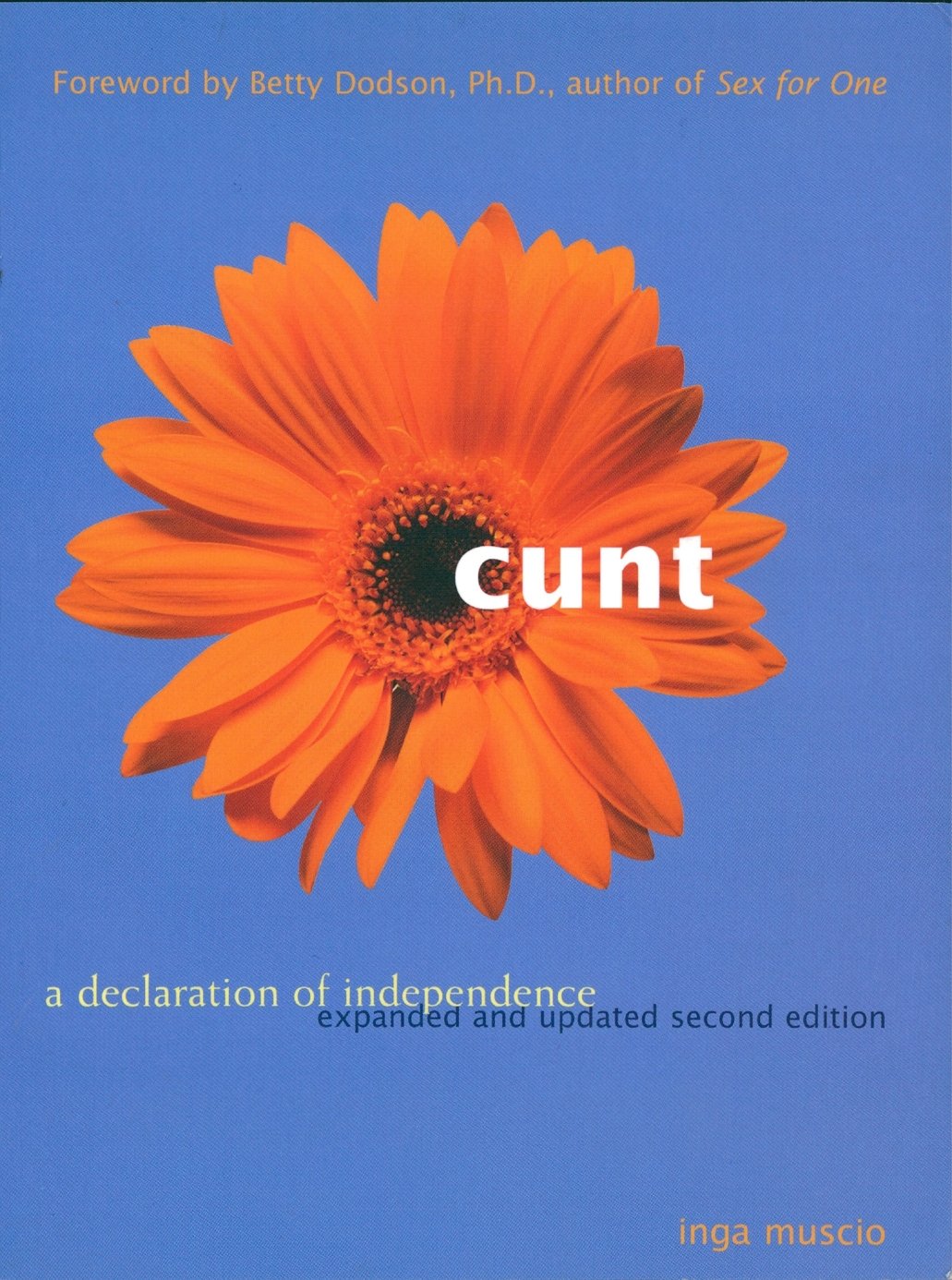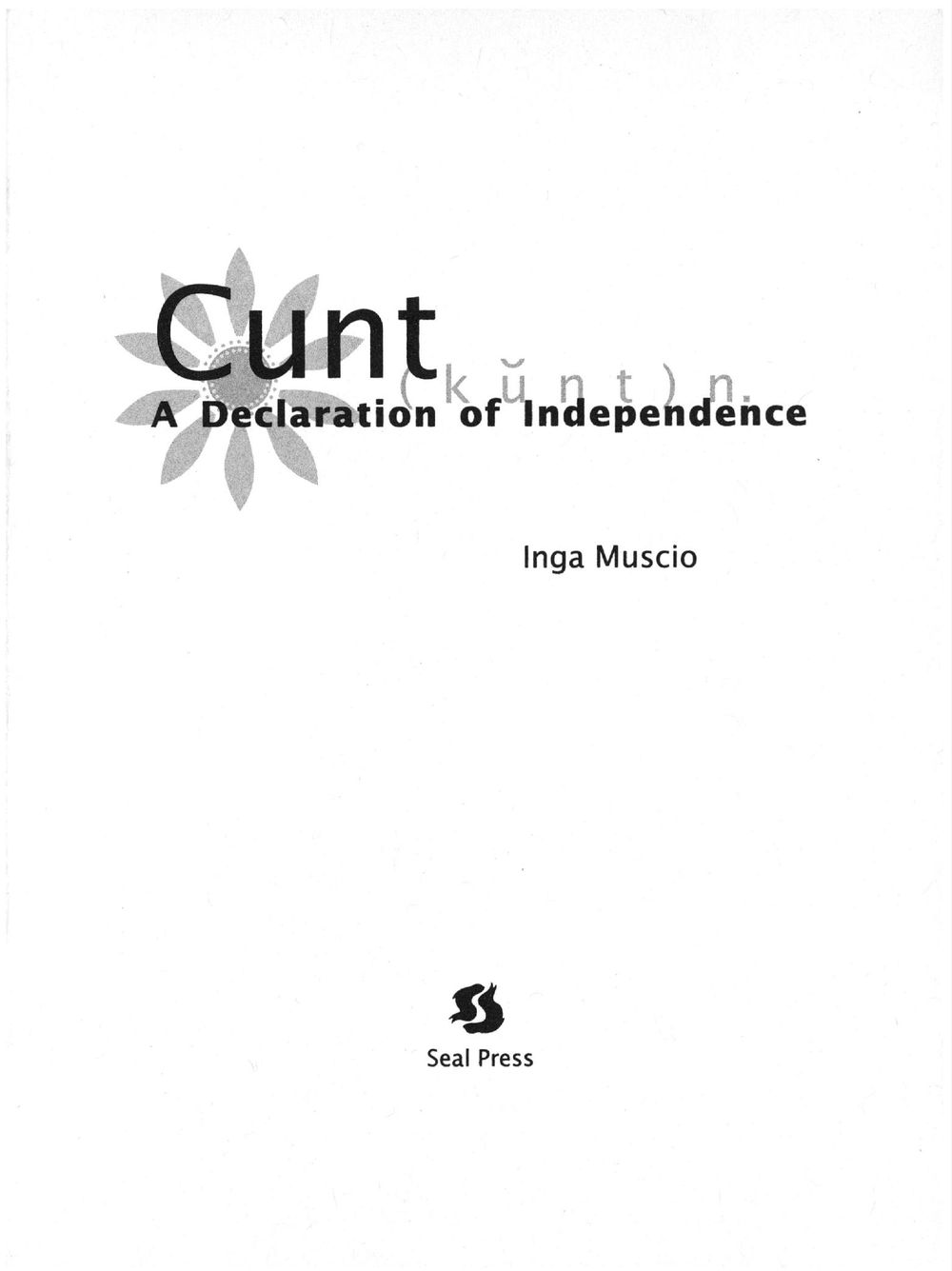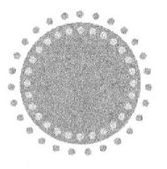Cunt
Authors: Betty Dodson Inga Muscio



CUNT:
A Declaration of Independence
© 2002 by Inga Muscio
Foreword ©2002 by Betty Dodson
Introduction © 2002 by Derrick Jensen
Published by Seal Press
A member of the Perseus Books Group
1700 Fourth Street
Berkeley, CA 94710
All rights reserved. No part of this book may be reproduced or transmitted in any
form without written permission from the publisher, except by reviewers who may quote
brief excerpts in connection with a review.
Credits are listed on page 365, which constitutes a continuation of the copyright
page.
Library of Congress Cataloging-in-Publication Data
Muscio, Inga.
Cunt: a declaration of independence / Inga Muscio.
p. cm.
Expanded and updated 2nd ed.
Includes bibliographical references (p. 357-364).
eISBN 9781580050753
1. Women. 2. Women—Social conditions. 3. Women-Psychology. 4. Women-Identity. 5. Body,
Human—Social Aspects. 6. Sexism in language. 7. Feminism. I. Title.
HQ1233 .M87 2002
305.4--dc21
2003267081
ISBN-10: 1-58005-075-1
ISBN-13: 978-1-58005-075-3
15 14 13 12 11
Cover design by Rachel Ramstad and Ingrid Emerick Interior design by Maren Costa
Printed in the United States by Berryville Graphics Distributed by Publishers Group
West
In Loving Dedication:
To everyone with Cuntlove in their hearts,
especially my Sacred Mother.
I thank you for giving me life.
Unless otherwise stated, throughout this book the words “gentleman,” “man” and the
like are used to refer to the tightly knit, male social power structure as it is recognized
in American patriarchal society.
Let it be known that the author is fully cognizant of the fact that many men in this
world strive for women’s rightful place in society. Without the work, study, love
and support of certain members of the male sector of humanity, this book would not
have been as thoroughly articulated as it was.
The author is grateful and indebted to many members of this sector of humanity, both
living and dead, of which her loving father, brothers, nephews, Malcolm X and Robert
Graves are merely six.
The author would also like to acknowledge that masculine and feminine nouns and pronouns
impose unrealistic limitations on lived human experience. The author looks forward
to the time when our vocabulary reflects the reality and complexity of our multi-gendered
human nature.
All that said, the author continues to be free to talk some serious shit.
A friend sent me a book with a note that said, “Dodson, you’re gonna love this woman.”
The bright yellow cover had a pink daisy with “cunt” written in its center. I dropped
the book into my handbag to read on my trip to San Francisco the following day.

The plane landed before I knew it. My nose was buried in this bold, brave declaration
of independence written by a young woman named Inga Muscio, who was surely my spiritual
granddaughter.
Over the next four days, during business meetings and social dinners, I kept asking
friends about the author who had the guts to title her book
Cunt.
Did anyone know her? The book jacket said she was a recluse, but I figured a cuntlovin’
woman like me could get through to her. I left my phone number with her publisher,
knowing everyone comes to New York City at some point.
Although Inga and I span two generations of feminism, we share a lot in common. Both
of us embrace the old Anglo-Saxon noun, “cunt,” that claims the innate power of the
sex organ it names.
In my first book,
Liberating Masturbation
, which was self-published in 1974, I had a chapter titled “Becoming Cunt Positive”
followed by sixteen full-page pen-and-ink portraits of my friends’ cunts. Inga begins
Cunt
by informing us about her reconciliation with the word and the anatomical jewel it
names. She points out that when popes or politicians refer to female genitalia, “the
term ‘vagina’ is discreetly engaged.” She writes that the word originated from a term
meaning “a scabbard or sheath for a sword,” and rightly concludes, “Ain’t got no vagina.”
From the nineteen-sixties to the present day, I have objected to the term “vagina”
because it refers to the birth canal and leaves out the clitoris, the primary source
of women’s sexual pleasure. As a budding feminist author in the seventies, I was furious
to discover the vast number of women struggling, and mostly failing, to have an orgasm
from penis/vagina intercourse and blaming themselves. I proclaimed that “frigid” is
a man’s word for a woman who can’t have an orgasm in the missionary position in a
few minutes, with only the kind of stimulation that’s good for him.
Among the many things that excited me about
Cunt
was how it took me back to my feminist awakening. My perspective was grounded in
the sexual revolution of the sixties and seventies. Abandoning marriage and monogamy
and claiming my sexuality radically altered my life. This new feeling of empowerment
gave me the courage to have the first one-woman exhibition of erotic art in New York
City. I began writing articles and speaking out about the importance of women embracing
masturbation so we could develop and define our own sexuality. I designed a workshop
I called “Physical and Sexual Consciousness Raising.” My feminist commitment evolved
into helping women learn to become orgasmic by experimenting with different forms
of clitoral stimulation. I ended up leaving my art studio for what became a twenty-five-year
career running masturbation workshops.
Inga is a product of the eighties and nineties, when many mainstream feminists wanted
to censor pornography and the anti-violence movement merged with an anti-sex movement.
My worst fear while reading
Cunt
was that I’d be engulfed in a PC feminist rant, an anti-sex diatribe focused on ending
violence against women. But I discovered that Inga’s adamant anti-rape stand was not
anti-sex. Instead, she offered ways for women to deal with rape beyond impotently
stomping our feet, hating sex and blaming men.
I silently cheered when she said we needed to learn self-protection, suggesting practical
techniques for protection like the one she uses for dashes to the store late at night:
she calls a friend to let her know she is going out, puts rocks in her pocket, jumps
on her bike and goes. For me, the best part about studying martial arts and self-protection
in the seventies was learning to avoid dangerous situations in the first place.
I have observed the women’s movement for the past forty years, and we’ve routinely
avoided the subject of sexual pleasure. From Women Against Pornography to the current
V-Day campaign to end violence against women and girls, sex continues to be equated
with violence. As if ending violence for biological women alone could ever change
anything.
Every Valentine’s Day, the one day that celebrates lovers, the
Vagina Monologues,
which spawned V-Day, is performed around the world. Yes, we can say it’s a beginning.
Or we can say that the good old boys have thrown us another bone. The adorable Dr.
Ruth saying “penis” or “vagina” or “sexual arrrrrrousal” entertained us, but merely
saying the words publicly provides no new information that improves our sex lives.
I tend to question anything or anyone that gets corporate sponsorship, for it wouldn’t
get corporate sponsorship if it truly challenged the status quo. Corporate feminism
is a far cry from the early feminist movement of the seventies. Back then we sat in
a circle, which broke through the traditional model of a leader or expert standing
in front of a group. We shared the truth about our lives, making “I” statements instead
of giving advice. As we spoke, we began to realize that how we were living was indeed
the result of the current political climate. This new awareness gave rise to the powerful
feminist statement of the seventies, “The personal is political.” Unfortunately, this
brilliant concept has rarely been applied to our sexuality.
As long as we continue to insist that sex is a private matter, public discourse by
most feminist authors, scholars and women’s studies educators will continue to focus
on rape, incest and abuse. Many feminist leaders avoid discussing the subject of pleasure
for different reasons. If they celebrate sexual pleasure, they will be attacked by
right-wing factions. On the other hand, going public with their sex lives is still
considered threatening within the mainstream feminist movement. Having no sexual pleasure
would be as embarrassing as having too much, or the “wrong” kind. Until more feminists
have the courage to openly claim and enjoy their own sexuality and sexual pleasure,
the women’s movement will remain stuck in a joyless discourse which does not improve
society.
I’ve been told by corporate feminists that talking about sexual pleasure when there
is so much sexual violence against women is inappropriate, insensitive and politically
incorrect. And who is to blame for all the sexual violence in the world? Dare I ask
why so many feminists think biological women have cornered the market on being victimized
by violence? Will I sound too insensitive in mentioning the violence caused by poverty,
hunger and wars that affect women, men and children of every gender?
In
Cunt
, I found a young feminist brave enough to claim her body, her cunt and her sexuality.
She openly supports masturbation, which is the bottom line of pleasure. Although the
acceptance of masturbation has made headway over the last few decades, it has not
been nearly enough for me. My idea of sexual liberation is linked back to the suffragette
movement and my hero Victoria Woodhull’s declaration of free love.
Cunt’s
subtitle is
A Declaration of Independence
; I want sexual independence. I want to free sex from the old religious morality of
heterosexual marriage as the only viable lifestyle. I want to see the end to the double
standard that allows men an abundance of sexual choices while they pose as monogamous
married men and insist on faithful wives.
Inga and I have both endured abortions. The comparison between them shows some progress.
One of mine was an illegal kitchen-table abortion in the fifties with a metal tool
scraping out my uterus without any anesthesia. One of hers was gently induced with
massage and herbs, which was far more civilized. Both of our unwanted pregnancies
were with men we liked. Unfortunately, we had been thinking with our clits and forgot
about birth control. Sex is a powerful force.
Inga did eventually make to it New York, and she called me. Over dinner, one of the
first things I asked her was how she handled telling strangers the title of her book.
She replied that she simply said, “It’s a women’s studies book.” How clever of her.
In the seventies, I felt obliged, or maybe challenged, to say the name of my book
every time someone asked.
We had a good laugh when I told the story about the cab driver who inquired about
my line of work. When I said I had just written and published (and was now distributing)
a book, naturally he wanted to know the title. Full of feminist fervor, I proudly
said, “
Liberating Masturbation,”
and he drove smack into the car in front of us that had stopped at a red light. From
that day on I made it a point to use the second title,
A Meditation on Selflove,
whenever I was in a moving vehicle.
When I sold the book to Crown, the title was changed to
Sex for One
, but that didn’t fool anyone. If people hesitate to buy my book for fear the salesperson
will think they are going home to masturbate, how do folks handle asking for
Cunt?
As we talked, Inga and I agreed that one of the big, glaring problems today is the
pitiful state of sex education in our schools. Currently religious groups have imposed
their own beliefs on public-school students with government-funded, abstinence-only
programs that limit sexual expression to heterosexual, monogamous marriage. Our teens
are being told that birth control usually fails, and abortion and homosexuality are
morally wrong. And, as ever, masturbation is never mentioned as a safe alternative
to penis/vagina intercourse. While religious leaders claim we have a choice as to
whether or not we follow God’s laws, our teens are not given a choice.
We also agreed that until America accepts sexual diversity as the law of the land
and includes lesbians, gay men, bisexuals, transsexuals, genderqueers and intersex
people, we will remain in the Dark Ages of human sexual expression. We all need to
come out of our sexual closets. We need to be able to talk about sex without shame
and take pride in how we choose to enjoy our bodies and genitals. Otherwise the public
discourse on sex will continue to focus on abuse, rape, incest, disease and dysfunction.
It’s time we begin to discuss sexual skills that will help us experience pleasure.
I believe that thought creates form, and I hold the image of a future filled with
women who are cunt-positive and orgasmic on their own terms. My declaration of independence
includes sexual and financial self-sufficiency. We will have an equal voice in government
and decision-making. Raising our children to be fair-minded and sex-positive is our
best hope for the future.
The intergenerational friendship between Inga and me is time-binding, a concept of
Alfred Korzybski, a mathematician who wrote a book called
Science and Sanity.
Time-binding is building upon the knowledge of each generation, accumulating it and
passing it on in order to learn from our mistakes and avoid repeating history. Just
as I was inspired by sex-positive Victoria Woodhull, I hope I have inspired Inga,
and that she will be there to inspire the next generation of young women.
Inga and I continue to stay in touch, time-binding our ideas of sex-positive feminism.
She says I remind her of her grandmother, and I tell her she is the granddaughter
of my dreams. When we talk together, our age difference disappears. We are feminists
who want equal rights for women all over the world, and that includes sexual pleasure.
Betty Dodson, Ph.D.
New York City, June 2002